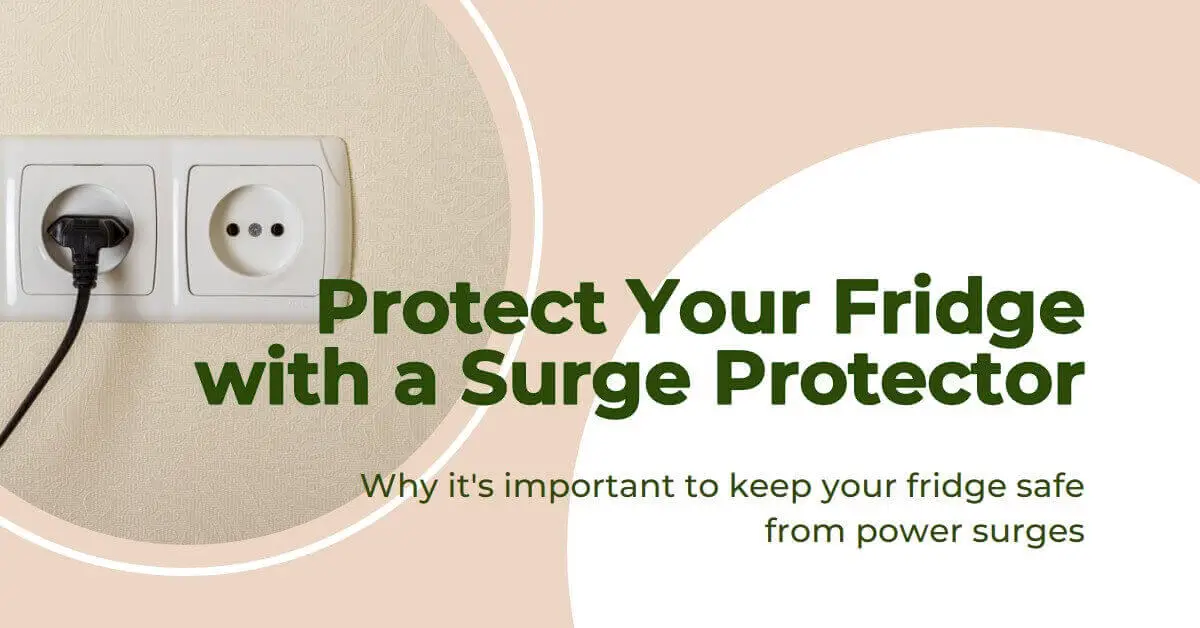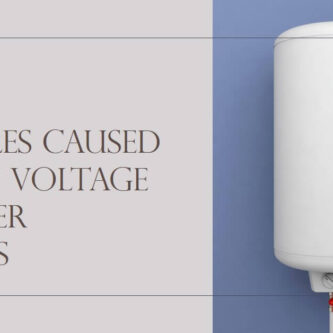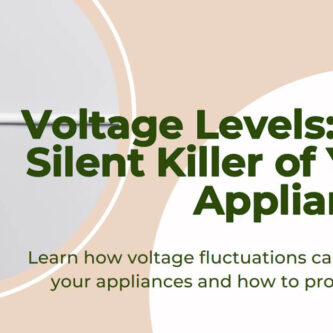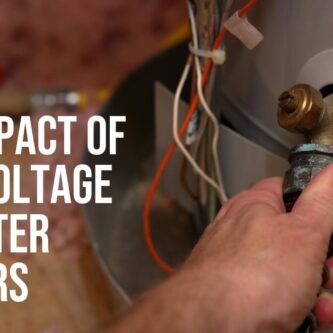Image: “Article Feature Image” by Bing is licensed under CC BY-NC-SA 4.0. Source: Bing Graphic Art. License: CC BY-NC-SA 4.0.
Refrigerators are essential appliances in our daily lives, keeping our food fresh and beverages cold.
However, there are potential risks that can pose a threat to their functionality, such as overvoltage.
When a refrigerator experiences overvoltage, it can lead to various damaging effects. The electrical components of the refrigerator, such as the compressor, thermostat, and control boards, are particularly susceptible to harm
This article aims to explore the effects of overvoltage on refrigerators, ways to protect them, signs of damage, and preventive measures.
Understanding Overvoltage
Overvoltage occurs when there is an excess of electrical voltage beyond the normal operating range.
It can be caused by various factors, including lightning strikes, power grid fluctuations, and electrical faults.
These voltage spikes can have detrimental effects on sensitive electronic devices, including refrigerators.
The Effects of Overvoltage on Refrigerators
Overvoltage can cause significant damage to the electrical components of a refrigerator, leading to malfunctioning and decreased performance. Some of the potential damages include:
1. Potential Damage to Electrical Components
The compressor, thermostat, and control boards are particularly vulnerable to overvoltage. Excessive voltage can strain or burn these components, rendering them ineffective.
Repairs or replacements can be costly, and the overall lifespan of the refrigerator may be shortened.
2. Impact on Cooling Performance
Overvoltage can disrupt the cooling process in refrigerators, resulting in inconsistent temperatures and reduced efficiency.
The appliance may struggle to maintain optimal cooling, leading to spoiled food and increased energy consumption.
3. Safety Risks
Apart from functional damage, overvoltage poses safety risks. High voltage surges can increase the chances of a fire hazard, potentially putting your home and loved ones at risk.
Additionally, there is a risk of electrical shock when handling a compromised refrigerator.
Read also mu article: Is Voltage Drop Killing Your Refrigerator? Here’s What You Need to Know.
Protecting Refrigerators from Overvoltage
Fortunately, there are measures you can take to safeguard your refrigerator from overvoltage:
1. Surge Protectors
Using surge protectors is a proactive approach to shield your refrigerator from voltage spikes. These devices are designed to divert excess voltage away from the appliance, safeguarding it from damage.
Make sure to choose surge protectors with sufficient voltage ratings and consider installing one specifically for your refrigerator.
Recommended surge protection device for you “affiliate link”:
2. Voltage Stabilizers
Voltage stabilizers help regulate the incoming electrical voltage to maintain a steady and safe level.
By keeping the voltage within the acceptable range, stabilizers can prevent damage caused by overvoltage.
Consult an electrician to determine the appropriate voltage stabilizer for your refrigerator.
I have serched for a good voltage stablizer for your fridge, I have found this one on Amazon, I recommend it for your fridge, however its an affiliate link I checked it to make sure it’s a good choice for you:
3. Uninterruptible Power Supply (UPS)
Consider connecting your refrigerator to an uninterruptible power supply (UPS). UPS systems provide backup power during blackouts or power surges, ensuring a consistent power supply and protecting your appliance from voltage fluctuations.
However, keep in mind that UPS systems are typically more expensive than surge protectors or voltage stabilizers.
Signs of Overvoltage Damage in a Refrigerator
Detecting overvoltage damage in a refrigerator is crucial to address issues promptly. Look out for these signs that may indicate damage:
1. Frequent Breakdowns
If your refrigerator is experiencing frequent breakdowns or requires repairs more often than usual, it could be a sign of overvoltage damage.
Electrical component failures caused by voltage spikes can result in malfunctions and breakdowns.
2. Unusual Noises
Strange noises emanating from your refrigerator, such as buzzing, humming, or clicking sounds, may indicate electrical component damage due to overvoltage. These noises are often a result of strained or faulty components.
3. Tripped Circuit Breaker
If your refrigerator repeatedly trips the circuit breaker, it could be a result of overvoltage damage.
The excess electrical load caused by damaged components may cause the circuit breaker to trip as a safety measure.
Preventive Measures
To prevent overvoltage damage to your refrigerator, consider the following preventive measures:
1. Regular Maintenance
Schedule regular maintenance checks for your refrigerator. Cleaning the coils, checking the wiring, and inspecting electrical connections can help identify potential issues early and prevent overvoltage damage.
2. Professional Inspection
Hire a qualified technician to inspect your refrigerator’s electrical components periodically.
They can assess the condition of the compressor, thermostat, and control boards, ensuring they are functioning optimally and are not susceptible to overvoltage damage.
3. Power Grid Protection
Contact your electricity provider to inquire about protective measures against power grid fluctuations, such as installing surge protection devices at the main electrical panel or transformer.
These measures can help mitigate overvoltage risks for your entire household.
Conclusion
Protecting your refrigerator from overvoltage is crucial to ensure its longevity and reliable performance.
By understanding the potential damage, implementing preventive measures, and being vigilant for signs of overvoltage damage, you can safeguard your refrigerator from the detrimental effects of voltage spikes.
Remember to invest in surge protectors, voltage stabilizers, or UPS systems, and prioritize regular maintenance and professional inspections.
Taking these precautions will help maintain the functionality and safety of your refrigerator for years to come.
you work With Electricity! Don’t leave empty-handed!
Looking to stay ahead of the game in the world of electrical engineering? Subscribe to my YouTube channel and gain access to exclusive content you won’t find anywhere else!
The staff I recommend (Amazon Affiliate Links to products I believe are high quality):
- Economy 120 Volt/60Hz AC Power Source – Step-Down Voltage & Frequency Converters 1800W
- UNI-T Digital Multimeter Tester UT139C
- 50-Amp Extension Cord for RV “100ft”
- Voltage Stabilizer 110/220v
- Hair Dryer “best selling“
- TOSHIBA EM131A5C-BS Countertop Microwave Ovens
Disclaimer: This contains affiliate links to Amazon products. I may earn a commission for purchases made through these links.




